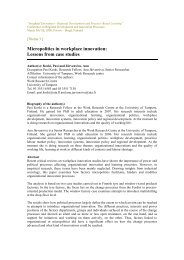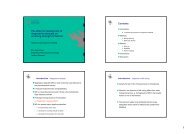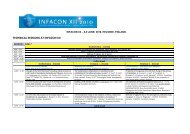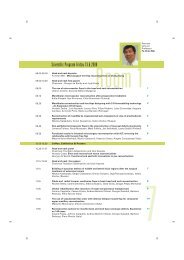Enhancing employees' innovation activity through motivational factors
Enhancing employees' innovation activity through motivational factors
Enhancing employees' innovation activity through motivational factors
Create successful ePaper yourself
Turn your PDF publications into a flip-book with our unique Google optimized e-Paper software.
“Insightful Encounters - Regional Development and Practice–Based Learning”<br />
Conference on Regional Development and Innovation Processes<br />
March 5th-7th, 2008, Porvoo - Borgå, Finland<br />
Inspirational motivation is the articulation of leaders about a vision that is interesting and<br />
inspiring to followers. Leaders with inspirational motivation challenge followers with high<br />
standards, communicate optimism about future goals, and provide meaning for the task at hand.<br />
Followers need to have a strong sense of purpose if they are to be motivated to act forward<br />
individually as well as within groups. Furthermore, visionary aspect of leadership should be<br />
supported by communication skills that allow the leader to articulate his or her vision with<br />
accuracy and power in a compelling and convincing way.<br />
With intellectual stimulation leaders are able to increase awareness of problems and persuade<br />
employees to deal with problems from different viewpoints. Moreover, leaders challenge<br />
assumptions, take risks and seek ideas of employees in order to stimulate and encourage<br />
creativity among employees. Individual consideration is about the leader attends to each<br />
follower's needs, acts as a mentor or coach to the follower and listens to the follower's concerns<br />
and demands. This also covers the need to respect and celebrate the individual input that each<br />
employee is able to contribute to the team. The true strength is on a diversity of the team.<br />
Motivated employees performing in the innovative organisation<br />
Intrinsically motivated employees do their job well whether or not they are supervised; they have<br />
strong intrinsic motivators, passion for doing something, to innovate (Felberg and DeMarco 1992;<br />
Thomas and Velthouse 1990; Knight 1987). When people feel that the assignment itself is<br />
exciting and rewarding, they will share knowledge (Miles et al. 2005, 98-101).<br />
Organizational Citizenship behaviour (OCB) is an exceptional type of individual’s work<br />
behaviour being productive to the organisation. This type of behaviour can not be recognised<br />
directly or explicitly by the formal reward system. OCB is based on employee’s personal choice<br />
to give extra effort at work and it is related to organisational commitment and job satisfaction.<br />
(Van Dyne & Pierce 2004; Organ 1987) So the challenge of OCB in complex and innovative<br />
work environments is in the employment relationships which are not any more a bond to be taken<br />
for granted. OCB is thought to have an essential impact on the effectiveness and efficiency of<br />
work teams and organisations, as a result enhancing to the overall productivity of the<br />
organisation.<br />
It is assumed that employees balance their working efforts with the degree they perceive the<br />
organisation to respond with desirable returns (Tsui & Wu 2005; McDonald & Makin 2000).<br />
Employees’ feelings that the organisation values their contribution and is interested in their wellbeing<br />
are positively related to employees’ performance and organisational commitment. If<br />
employees feel the organisation has failed to fulfill promised obligations they are less likely to<br />
give their best effort and less likely to engage in organisationally-directed citizenship behaviour.<br />
(Coyle-Shapiro et al. 2006, Fuller et al. 2003)<br />
Bettencourt (2004) and Choi (2007) have studied change-oriented organisational citizenship<br />
behaviours. Even tough, the concept is based on the cooperative forms of OCB but the difference<br />
from “traditional” OCB or any other extra-role behaviors to change-oriented organisational<br />
citizenship behaviour is an importance on employee character besides situational influencers.<br />
This means that employees must be change oriented and willing to take risks even it might upset<br />
the status quo as well as interpersonal relationships at least in the short term.<br />
OCB has been conventionally tried to define by studying direct relationships from affective<br />
appraisals of managers, the job or by the <strong>factors</strong> of work context. (Mackenzie, Podsakoff & Rich<br />
2001) In some current studies demonstrate the efficacy of espousing the interactionist standpoint








